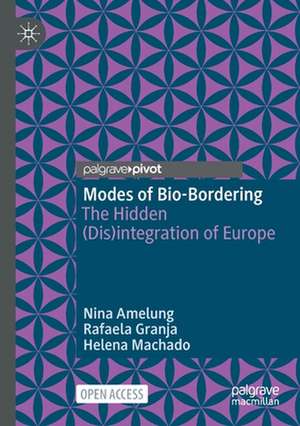Modes of Bio-Bordering: The Hidden (Dis)integration of Europe
Autor Nina Amelung, Rafaela Granja, Helena Machadoen Limba Engleză Paperback – noi 2021
This open access book explores how biometric data is increasingly flowing across borders in order to limit, control and contain the mobility of selected people, namely criminalized populations. It introduces the concept of bio-bordering, using it to capture reverse patterns of bordering and ordering practices linked to transnational biometric data exchange regimes. The concept is useful to reconstruct how the territorial foundations of national state autonomy are partially reclaimed and, at the same time, partially purposefully suspended. The book focuses on the Prüm system, which facilitates the mandatory exchange of forensic DNA data amongst EU Member States. The Prüm system is an underexplored phenomenon, representing diverse instances of bio-bordering and providing a complex picture of the hidden (dis)integration of Europe. Particular legal, scientific, technical and political dimensions related to the governance and uses of biometric technologies in Germany, the Netherlands,Poland, Portugal and the United Kingdom are specifically explored to demonstrate both similar and distinct patterns.
| Toate formatele și edițiile | Preț | Express |
|---|---|---|
| Paperback (1) | 345.89 lei 6-8 săpt. | |
| Springer Nature Singapore – noi 2021 | 345.89 lei 6-8 săpt. | |
| Hardback (1) | 418.45 lei 6-8 săpt. | |
| Springer Nature Singapore – 31 oct 2020 | 418.45 lei 6-8 săpt. |
Preț: 345.89 lei
Nou
Puncte Express: 519
Preț estimativ în valută:
66.18€ • 69.10$ • 54.78£
66.18€ • 69.10$ • 54.78£
Carte tipărită la comandă
Livrare economică 04-18 aprilie
Preluare comenzi: 021 569.72.76
Specificații
ISBN-13: 9789811581854
ISBN-10: 9811581851
Pagini: 151
Ilustrații: XI, 151 p. 4 illus., 2 illus. in color.
Dimensiuni: 148 x 210 mm
Greutate: 0.2 kg
Ediția:1st ed. 2021
Editura: Springer Nature Singapore
Colecția Palgrave Pivot
Locul publicării:Singapore, Singapore
ISBN-10: 9811581851
Pagini: 151
Ilustrații: XI, 151 p. 4 illus., 2 illus. in color.
Dimensiuni: 148 x 210 mm
Greutate: 0.2 kg
Ediția:1st ed. 2021
Editura: Springer Nature Singapore
Colecția Palgrave Pivot
Locul publicării:Singapore, Singapore
Cuprins
Chapter 1 – Introduction.- Chapter 2 – A brief history of the evolution of forensic biometrics and biometric database systems crossing borders in EU law enforcement.- Chapter 3 – Biobordering as a concept.- Chapter 4 – Germany.- Chapter 5 – The Netherlands.- Chapter 6 – Poland.- Chapter 7 – Portugal.- Chapter 8 – The United Kingdom.- Chapter 9 – Conclusion.
Notă biografică
Nina Amelung, PhD, University of Minho, is a sociologist working in the project EXCHANGE, funded by European Research Council and led by Helena Machado. Her current research is on the democratic challenges of cross-border biometric data-exchange, and the making of publics in European crime, migration and border control regimes.
Rafaela Granja, PhD, University of Minho, is a sociologist working in the project EXCHANGE. Her current research explores the transnational exchange of DNA data and controversies associated with scientific and technological innovations in the forensic field. Her previous work has focused on reconfigurations of family relationships inside and outside prisons.
Helena Machado, Full Professor of Sociology, University of Minho, is a transdisciplinary researcher, engaging the social studies of science, bioethics, and sociological and criminological perspectives to explore how genetics creates acute challenges to citizenship, democracy and social control in contemporary societies.
Textul de pe ultima copertă
This open access book explores how biometric data is increasingly flowing across borders in order to limit, control and contain the mobility of selected people, namely criminalized populations. It introduces the concept of bio-bordering, using it to capture reverse patterns of bordering and ordering practices linked to transnational biometric data exchange regimes. The concept is useful to reconstruct how the territorial foundations of national state autonomy are partially reclaimed and, at the same time, partially purposefully suspended. The book focuses on the Prüm system, which facilitates the mandatory exchange of forensic DNA data amongst EU Member States. The Prüm system is an underexplored phenomenon, representing diverse instances of bio-bordering and providing a complex picture of the hidden (dis)integration of Europe. Particular legal, scientific, technical and political dimensions related to the governance and uses of biometric technologies in Germany, the Netherlands, Poland, Portugal and the United Kingdom are specifically explored to demonstrate both similar and distinct patterns.
Caracteristici
Offers an innovative analytical approach as a tool for cross-country comparison to make explicit the rather invisible bordering practices along transnationally expansive biometric technologies. Provides a panorama on cross-country dynamics, as well as the different countries’ situations by demonstrating how the particularities of national policy regulations and judicial traditions, as well as technological infrastructures and techno-political cultural repertoires, either enforce, complement or counter the bio-bordering dynamics of the EU. Examines how national autonomy and sovereignty is claimed, negotiated and suspended not only through legal and political bordering processes, but also through scientific and technical bordering practices that correspond with techno-political cultures and manifest specific regimes for biological data retention and exchange.
